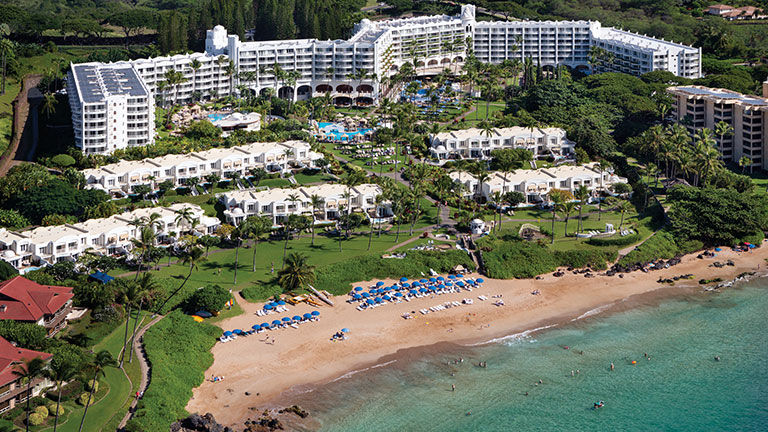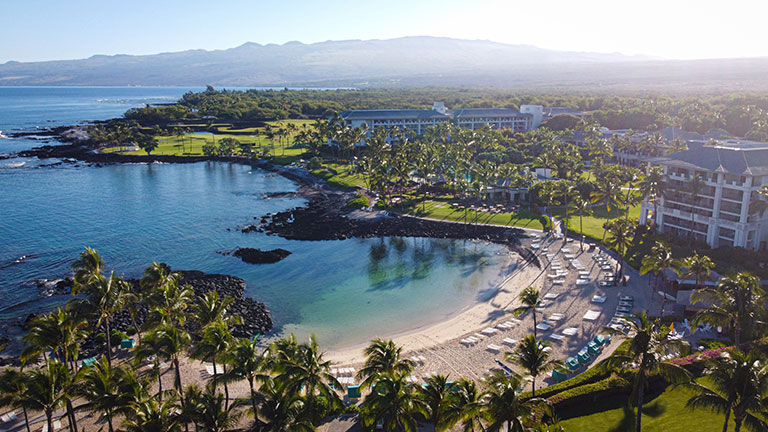The Hawaiian word malama means “to care for,” and as travelers have returned to Hawaii in the pandemic era, the Hawaii Tourism Authority (HTA) has promoted a “Malama Hawaii” initiative to encourage visitors to travel with care, both for themselves and for the destination.
“Malama is a value that we live,” said Kalani Ka'ana’ana, chief brand officer for the HTA. “So, the most important thing we can do is inspire travelers … to ‘travel pono’ [explore with care].”
To celebrate their 30th anniversaries, Fairmont’s two Hawaiian luxury resorts — Fairmont Kea Lani on Maui and Fairmont Orchid on Hawaii — have both introduced new cultural programs to encourage clients to malama Hawaii and travel pono.
Fairmont Kea Lani, Maui
Open since 1991 on Maui’s south shore, Fairmont Kea Lani is marking its milestone with new cultural experiences and initiatives that provide opportunities for guests to give back to the island.
“When we looked for ways to celebrate our 30th anniversary, we took a look at what was important to the hotel and what defines us,” said Alexis Eaton, director of public relations and communications at Fairmont Kea Lani. "After capturing those details, we formed our ‘Kuleana Commitment’ … to share our cultural history and malama our home.”
 Fairmont Kea Lani opened in 1991 on Maui’s south shore.
Fairmont Kea Lani opened in 1991 on Maui’s south shore.
Credit: 2022 Fairmont Kea LaniClients can participate through voluntourism partnerships with local organizations, including a reforestation initiative called Rooted in Aloha that provides opportunities from planting trees on the slopes of Haleakala to planting seeds in the resort’s greenhouse. Guests can also sponsor native higher-elevation trees that benefit Maui’s endangered wildlife.
According to landscaping manager Fred Rindlisbacher, my sons and I were the very first guests to plant aalii and koa tree seeds, which will be large enough to move to Haleakala in a couple of months. It was a fun and easy way to contribute to the program while learning about Hawaiian culture (and horticulture).
“You can go anywhere and get sun and sand, but you can’t go anywhere and get Hawaiian culture,” Rindlisbacher said. “We want to share our Hawaiian culture because it’s so important and so exceptional.”
 Kea Lani's Rooted in Aloha program provides opportunities for clients to plant trees along the slopes of Haleakala.
Kea Lani's Rooted in Aloha program provides opportunities for clients to plant trees along the slopes of Haleakala.
Credit: 2022 Fairmont Kea LaniDuring its anniversary year, Kea Lani is also set to undergo a multimillion-dollar renovation that will include a complete transformation of all suites and villas, as well as a remodeled lobby with a brand-new restaurant, immersive gardens and a cultural center expected to debut in December.
“One of the things that marks this renovation is our ability to tell our cultural story … and highlight the beauty of Maui, from mauka to kai [mountain to sea],” Eaton said. “The opportunity with the interactive cultural center is to make sure it touches every individual coming through the hotel.”
One of the things that marks this renovation is our ability to tell our cultural story … and highlight the beauty of Maui, from mauka to kai [mountain to sea].
Fairmont Orchid, Hawaii Island
Located on the Kohala Coast of Hawaii Island, Fairmont Orchid opened in 1990, but due to COVID-19, is celebrating a belated 30th anniversary alongside its sister resort.
To commemorate the occasion, the resort pledged to “Malama Aina” (care for the land) and protect Hawaii Island for future generations. Guests are invited to participate in daily activities that celebrate Hawaii’s unique culture, and among the most popular is the Kalahiki Canoe Experience, a one-hour sunrise outrigger paddle that rewards early risers with a uniquely Hawaiian experience.
 Fairmont Orchid is celebrating 30 years on the Kohala Coast of the Big Island.
Fairmont Orchid is celebrating 30 years on the Kohala Coast of the Big Island.
Credit: 2022 Fairmont Orchid“It’s a real cultural way to greet the day,” said Elijah Smith, one of Fairmont Orchid’s Hui Holokai beach ambassadors. “We have time [on the water] in the dark … we drift, we talk story and we watch the sun rise up from behind the mountains as the light slowly touches everything.”
Smith notes the morning paddle is ideal during winter months because summer sunrise is at 5:30 a.m. and, he jokes, nobody would wake up for that.
Since December 2021, the Ulu Pono Garden Experience has allowed guests to visit the on-site Chef’s Garden with Ka’iulani Blankenfeld, director of Hawaiian culture, to learn about “canoe plants” brought to the island by ancient Polynesian voyagers, and harvest fruits, vegetables and herbs for use by the resort’s chefs. As a mahalo (thank you) for participating, guests are gifted Hawaiian chili pepper seeds to plant at home.
“Caring for the land as it cares for us has always been a core value for the property,” said Catherine Cambra, director of public relations and communications for Fairmont Orchid. “But even more so now that we have our new garden experience.”
Blankenfeld told me the resort had been thinking about the activity for a while, but reopening after a COVID-19 closure turned out to be a perfect time to introduce it.
The beauty of authenticity is that you can’t import it.
“We have many lovely Malama Hawaii activities on the Big Island, but not all our guests have a whole day, so we put this together to experience some culture and connect with the place,” she explained. “Our garden had no love and aloha when we were closed, but since coming back, things are starting to bloom, and we have a vision for growth."
Fairmont’s Hawaiian experiences certainly share the islands' unique culture, but hopefully, also inspire clients to seek out cultural experiences whenever they travel.
“The market is arcing toward meaningful and authentic experiences,” said John De Fries, President and CEO of the HTA. “And the beauty of authenticity is that you can’t import it.”
The Details
Fairmont Kea Lani
Fairmont Orchid